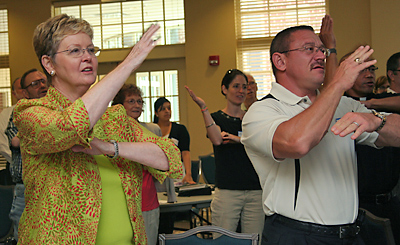
COLUMBIA—RCIA, or the Rite of Christian Initiation for Adults, leads seekers to the truth of the Gospel and of church teachings, and links the entire Catholic community to the ongoing history of the church.
That was the central message of “ABC’s of RCIA,” held Aug. 28 in the Cardinal Bernardin Center at St. Peter Church.
Ninety-five RCIA team leaders and members, clergy, and directors of religious education attended the event, sponsored by the Office of Catechesis and Christian Initiation. The keynote speaker was Nick Wagner. Based in California, he edits “Today’s Parish,” runs an online resource center and is the author of “The Way of Faith: A Field-Guide for the RCIA Process” and “The Heart of Faith: A Field-Guide for Catechumens and Candidates.”
Wagner told participants their role in RCIA was a central part of church history, and described how the church has brought in new members beginning with Jesus’ teaching and the Acts of the Apostles, continuing through the centuries to the formation of RCIA at the Second Vatican Council. After several revisions, an official English text was approved in 1986, and its use in the United States became mandatory in 1988.
The mission of preparing people to be baptized, confirmed, and to receive the Eucharist is a special one, he said. People who are receiving those three sacraments, traditionally at the Easter Vigil, are called catechumens.
 “The whole reason is to celebrate those sacraments so the people can then do the mission of God in the world,” Wagner said. “The reason for doing this is so people will not only be evangelized, but will go out and evangelize others.”
“The whole reason is to celebrate those sacraments so the people can then do the mission of God in the world,” Wagner said. “The reason for doing this is so people will not only be evangelized, but will go out and evangelize others.”
Wagner said it was important to remember that RCIA is not strictly programmed like an academic class.
“Initiation gradually takes place within a community of the faithful,” he said. “This is a gradual process that is different for every person. Someone who has never darkened the door of a church will need more formation and time.”
Leaders need to be able to deal with inquirers of different ages and with a wide variety of backgrounds and attitudes toward the church and Christian faith in general, he said. He also stressed the importance of creating a welcoming atmosphere in every parish.
Other workshops during the day focused on many facets of RCIA.
Franciscan Sister Noreen Buttimer led a workshop on “Breaking Open the Word: What Happens at Dismissal” about the importance of helping catechumens learn about the faith through Scripture. As part of the RCIA process, they traditionally leave Mass after the homily and meet with leaders to discuss the week’s readings and their relevance to daily life.
“When you break open the readings, the inquirers understand that they are going to come to understand the message of Jesus Christ and what the church teaches about it,” Sister Noreen said. “We have to show them how the word of God has meaning for us in our everyday lives, that we are to read it and live it. They’ll know the dogmas and teachings of the church and that they’re based in Scripture.”
Drew Burrichter, who attends Christ Our King Church in Mount Pleasant, led a session on “Creating A Welcoming Community.” He said that people seeking to learn more about the faith will be drawn to parishes where clergy and parishioners focus on making newcomers welcome.
“Hospitality is not optional,” Burrichter said. “Welcoming is what God wants us to do. We need to invite in those who appear to be treated like the ‘other.’ In your parish these people might be those who stand on the periphery during events. It might be somebody who might not look or think like you. Keep your eyes open for those on the fringe who need to be welcomed. It is every baptized person’s responsibility to reach out.”
Sts. Cyril and Methodius Sister Pamela Smith focused on how to start an effective RCIA team. Good choices would be Catholics who are well-versed in their faith and good listeners, while poor choices would include people who are overly judgmental about certain topics of doctrine, have an agenda to promote only one type of devotion or prayer, or are cafeteria Catholics who don’t believe all church teachings.
Other workshops discussed working with the varied people who come to RCIA or linking weekly readings to specific doctrine. Another important discussion was how to help people whose families don’t want them to become Catholic.
Charley and Jackie Francis are involved in RCIA with the Catholic Community of Sumter. The husband and wife said they learned about the importance of reaching out to others to share the gift of faith.
“RCIA is the community, and the community is RCIA,” Mrs. Francis said. “You can’t separate it.”
